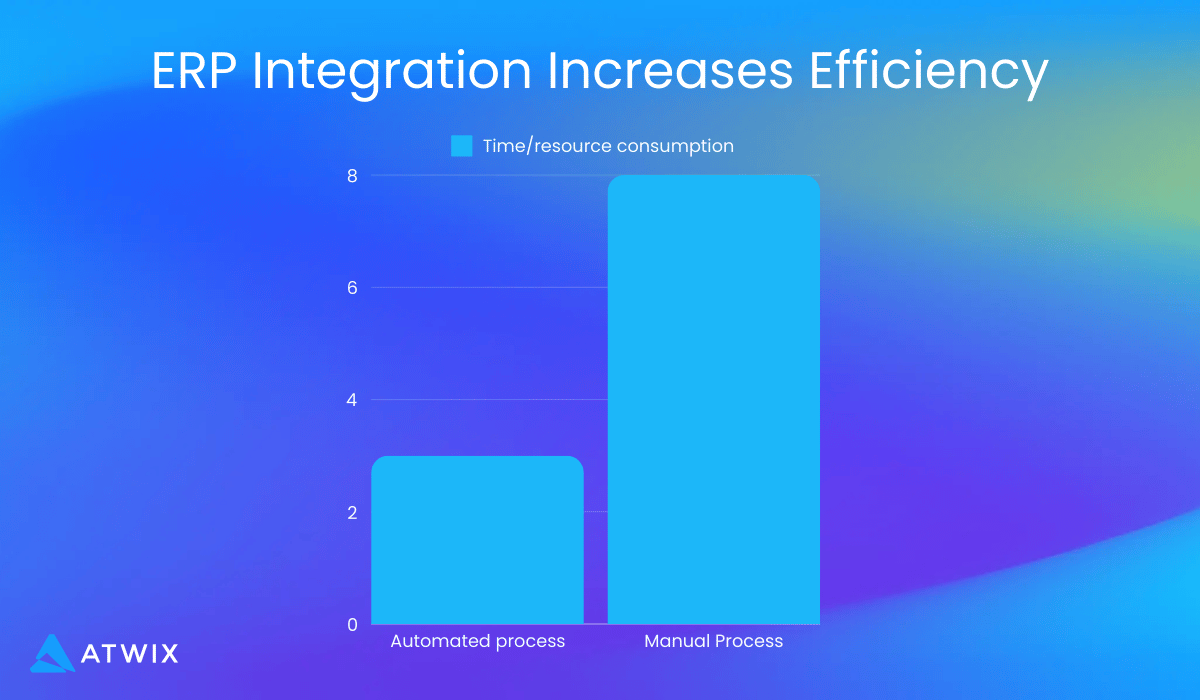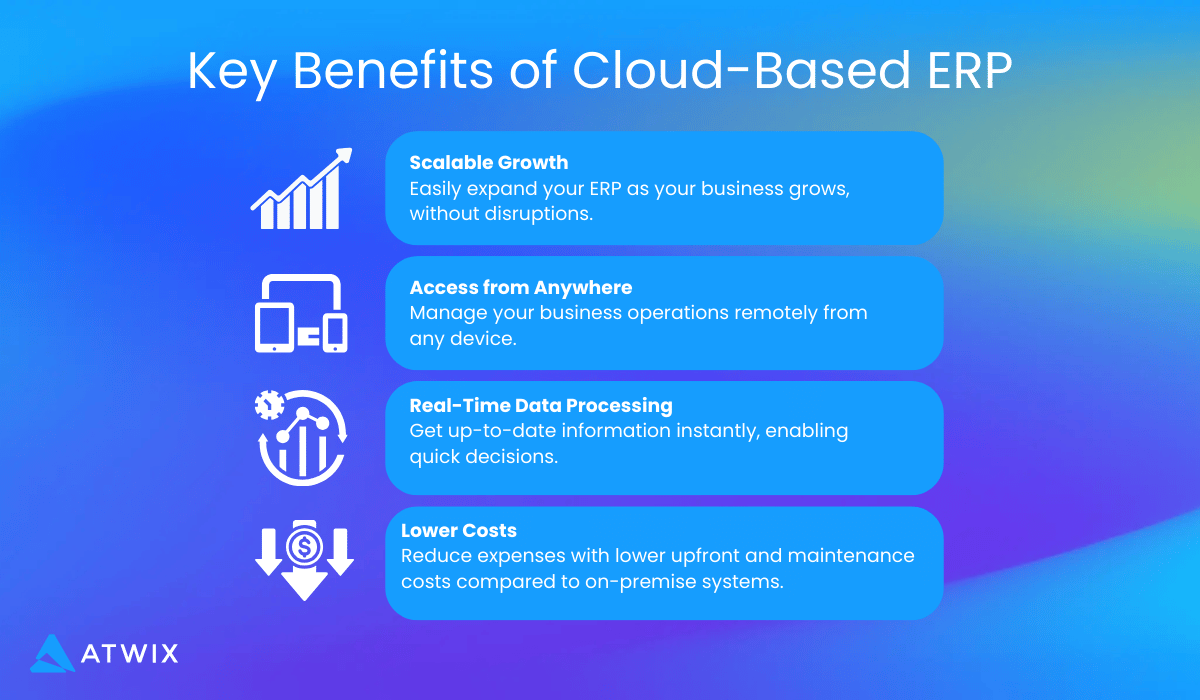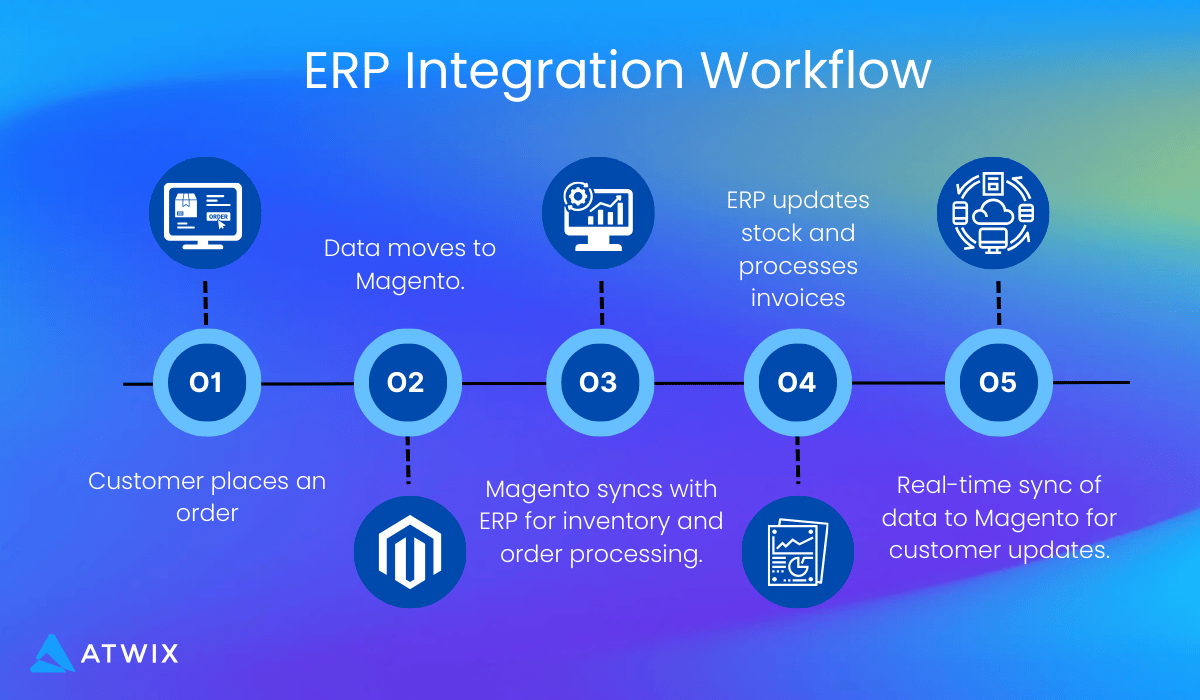Introduction: Why ERP Integration with Magento is Crucial
Running an eCommerce business these days can feel like you’re constantly putting out fires. There are so many things to keep track of—orders, inventory, customer data, and finances—that it’s easy to see why things might get out of hand. That’s where ERP integration with Magento steps in to save the day. Whether you’re working with B2B or B2C, combining these two systems can simplify operations, cut down on errors, and make everything run more smoothly.
At Atwix, we’ve spent over a decade fine-tuning Magento solutions for businesses like yours, helping them operate more efficiently. One of our flagship offerings is the Infor Pre-Integrated Magento Solution. This tool is all about creating a real-time connection between your ERP system and Magento/Adobe Commerce. It’s like having two parts of your business talking to each other all the time, making sure everyone’s on the same page—whether it’s managing customer orders, keeping track of inventory, or making sure invoices are handled on time.
- Why Does ERP Integration Matter for eCommerce?
- Cloud-Based ERP: A Smart Move
- Atwix Infor Pre-Integrated Solution: Streamline Your Operations
- Why Magento is the Ideal Platform for ERP Integration
- Key Benefits of ERP Integration with Magento
- Enhanced Efficiency: Cut Down on Manual Work
- Real-Time Data Sync: Make Better Decisions Faster
- Improved Customer Experience: Keep Them Coming Back
- Additional Growth Opportunities with ERP Integration
- Encouraging Online Purchasing
- Maximizing Average Order Value (AOV)
- Elevating Customer Lifetime Value (LTV)
- Hyvä Themes and ERP Integration: A Winning Combination
- Choosing the Right ERP System for Your Magento Store
- Case Study: Successful Magento ERP Integration
- Latest Trends in Magento ERP Integration for 2024
- Why Atwix is Your Go-To Partner for Magento ERP Integration
- Conclusion
Why Does ERP Integration Matter for eCommerce?
Let’s face it: eCommerce is growing like crazy, and with that growth comes new challenges. The bigger your business gets, the more moving parts you have to juggle. If your systems aren’t working together, you’re bound to run into issues like inventory problems, delayed orders, and outdated customer data. Nobody wants that, right?
That’s where ERP systems come in handy. They help centralize key functions, such as managing orders, keeping track of inventory, handling financial reports, and syncing customer data. When you connect this powerhouse to your Magento store, all these processes become automatic and run like clockwork.
Think about it: A customer places an order on your Magento store, and without ERP integration, you’d have to manually update the inventory, process the order, and hope nothing falls through the cracks. With ERP integration, all of this happens automatically. The order is processed, inventory gets updated in real-time, and your shipping team knows exactly what’s going on. It’s a game-changer that saves you time, reduces errors, and makes life a whole lot easier.

Cloud-Based ERP: A Smart Move
The world of ERP is evolving, and more businesses are making the switch to cloud-based ERP systems. Why? It’s simple. Cloud ERP is more flexible, scalable, and cost-effective compared to older, on-premise systems. Plus, with cloud ERP integration, your Magento store is always connected, and you can access your business operations from anywhere. Need to check inventory while you’re out of the office? No problem. Everything’s at your fingertips.
Another bonus of cloud ERP is that it makes scaling your business a breeze. As you grow, you don’t need to rip out your old systems and start from scratch. Cloud ERP adapts to your needs, making sure your business can keep growing without a hitch.

Atwix Infor Pre-Integrated Solution: Streamline Your Operations
Now that we’ve covered why ERP integration is so important, let’s talk about how Atwix makes it easier. The Infor Pre-Integrated Solution is built specifically for companies that need everything to work together seamlessly—without any headaches. It tackles the common pain points like managing real-time pricing, processing invoices, and automating order workflows. In other words, it’s built for businesses that want to get things done efficiently.
Real-Time Integration for a Smooth Ride

One of the biggest perks of Atwix’s Infor Pre-Integrated Solution is that it provides real-time ERP and Magento integration. What does that mean for you? Well, it means that everything from inventory updates to pricing changes happens instantly. When your customer checks your store, they see the most accurate and up-to-date info, without you having to lift a finger.
For B2B companies, where every customer might have their own pricing structure, this real-time integration is a lifesaver. Your customers can log in, see their own pricing, check stock availability, place orders, and track shipments—all in real time. It’s all about making their experience seamless while saving you time and effort.
This isn’t just about making your life easier though. Your customers will notice the difference too. They’ll appreciate how smoothly everything works, and that’s the kind of service that keeps them coming back for more.
Built for Flexibility and Growth
We know that no two businesses are exactly the same. That’s why Atwix’s Infor Pre-Integrated Solution is designed to be flexible. Built on the Atwix Framework, which has been fine-tuned over years of working with Magento, it allows you to customize things to fit your business. Whether you need to tweak your workflows, add new features, or change how pricing works, our solution can grow right alongside your business.
And the best part? It’s pre-integrated. That means you don’t have to wait months for a custom solution to be built from scratch. You can start benefiting from ERP integration faster, and with ongoing support from Atwix, you won’t have to worry about the technical side of things.
Why Magento is the Ideal Platform for ERP Integration
So, why Magento? What makes it the go-to platform for businesses looking to integrate their ERP systems? The answer is pretty simple: flexibility. Magento is an open-source platform that’s designed to adapt to your business needs. Whether you’re running a small online store or a massive eCommerce operation with thousands of products, Magento has the scalability to keep up. But that’s just the beginning.
Flexibility and Scalability: The Power of Magento
One of the things that sets Magento apart from other eCommerce platforms is its modularity. This means you can pick and choose the features you need and build out your store in a way that makes sense for your business. Want to add new payment gateways? No problem. Need a custom checkout process for your B2B customers? Magento can handle it. This flexibility becomes even more important when you’re looking at ERP integration because it allows you to tailor the system to match your workflows.
The platform also supports scalability. As your business grows, Magento grows with you. More orders, more products, more data—Magento can handle it all. And when it’s paired with the right ERP system, you’ve got a powerful combination that can manage your entire business from front to back.
Support for Omnichannel and Headless Commerce
Now, here’s where things get even more interesting. Magento doesn’t just stop at being an eCommerce platform. It’s also incredibly well-suited for omnichannel integration. That means whether your customers are shopping in-store, online, or on their mobile devices, they’ll get a seamless experience across all channels. With ERP integration, all of your channels are connected to a central system, so inventory, pricing, and customer data are always accurate and up-to-date no matter where the purchase is happening.
Then there’s the rise of headless commerce. In a nutshell, headless commerce is when you decouple the front-end experience (the part your customers see) from the back-end system (where all the data and operations live). This gives you the flexibility to use any front-end framework you want, while still using Magento and your ERP system for the heavy lifting behind the scenes. So, whether you’re building a custom website, a mobile app, or even a voice-activated shopping assistant, Magento’s open architecture makes it all possible.
Key Benefits of ERP Integration with Magento
Now that we’ve covered why Magento is the right platform, let’s dig into the specific benefits of integrating your ERP with Magento. Spoiler alert: It’s going to make your life a whole lot easier.
Enhanced Efficiency: Cut Down on Manual Work
The biggest win with ERP integration is the sheer efficiency it brings. No more manually entering data from one system into another. With ERP and Magento working together, information flows seamlessly between the two platforms. Orders, inventory updates, and customer data are automatically synced, which means fewer errors and less time spent on repetitive tasks.
For example, imagine your ERP system automatically updating inventory levels in Magento the moment stock is sold or received. This means your customers will always see accurate stock availability, and your team won’t have to worry about overselling or disappointing customers with out-of-stock items.
Real-Time Data Sync: Make Better Decisions Faster
We’ve all been there—trying to make decisions with outdated information. It’s frustrating and, more importantly, risky. But with ERP integration, all of your data is updated in real-time. Need to know how much stock you have on hand? Want to check your sales numbers for the day? Or maybe you’re trying to see if a particular customer has paid their invoice. With real-time data syncing between Magento and your ERP system, you have access to the latest information at any given moment.
This also extends to financial reporting. Since all your sales, orders, and returns are synced, your financial reports will always be accurate, giving you a clear picture of your business’s health without having to sift through spreadsheets.
Improved Customer Experience: Keep Them Coming Back
Customer satisfaction is everything in eCommerce. A bad experience can cost you future sales, while a great one can turn a customer into a loyal advocate for your brand. When your ERP and Magento are integrated, it’s much easier to provide that great experience.
Think about it: If your customers always see accurate stock levels, if their orders are processed faster, and if they receive timely updates on their shipping, they’re going to feel more confident in your brand. Plus, with real-time pricing and personalized offers that come from having a unified system, you can build stronger relationships with your customers, giving them more reasons to stick with you.
Additional Growth Opportunities with ERP Integration
While we’ve covered the core benefits of ERP integration with Magento, there are even more ways this powerful combination can drive your business forward. Let’s explore some additional advantages that can help you maximize your eCommerce potential.
Encouraging Online Purchasing
Ecommerce ERP integration can be a game-changer when it comes to encouraging customers to embrace your online platform. This is especially true for B2B businesses where clients might be accustomed to traditional ordering methods. By offering features like:
- Customized catalogs and pricing
- Streamlined reordering processes
- Account-specific payment terms
You’re making it irresistibly convenient for customers to shift their purchasing online. The result? A smoother operation for you and a modern, efficient experience for your clients.
Maximizing Average Order Value (AOV)
With your ERP and Magento working in tandem, you have powerful tools at your disposal to increase your AOV. Here are some strategies you can implement:
- Dynamic bundling based on inventory levels and customer preferences
- Tiered pricing structures that encourage bulk purchases
- Cross-sell recommendations powered by comprehensive customer data
By leveraging these tactics, you can encourage customers to add more to their carts, boosting your revenue without necessarily increasing your customer base.
Elevating Customer Lifetime Value (LTV)
While providing a great customer experience is crucial, ERP integration allows you to take it a step further by focusing on long-term customer relationships. Here’s how:
- Implement loyalty programs with real-time point tracking and redemption
- Offer predictive reordering based on customer purchase patterns
- Provide self-service account management with full order history and custom reporting
These features not only enhance customer satisfaction but also increase the likelihood of repeat business, ultimately driving up your customer LTV.
By focusing on these areas, you’re not just streamlining operations—you’re setting the stage for sustainable growth and increased profitability. ERP integration with Magento becomes a strategic asset, helping you unlock new levels of success in your eCommerce journey.
Hyvä Themes and ERP Integration: A Winning Combination
While we’ve touched on the technical side of ERP and Magento integration, let’s not forget about the customer experience. After all, what’s happening behind the scenes—whether it’s inventory updates or seamless invoicing—means nothing if your front end doesn’t deliver a great user experience. This is where Hyvä themes come into play.

Why Hyvä Matters
For those unfamiliar, Hyvä themes are a relatively new player in the Magento space, but they’re quickly becoming the go-to solution for businesses that want to boost site speed, improve the user experience, and increase conversion rates. Unlike Magento’s default themes, which can be a bit bulky and slow, Hyvä focuses on performance. It’s lightweight and optimized to give your customers a lightning-fast, smooth shopping experience.
Now, when you combine Hyvä’s fast front end with a powerful ERP integration, you’re giving your customers the best of both worlds. On the surface, they’re getting an easy-to-navigate, fast-loading website that makes shopping a breeze. Behind the scenes, your ERP system is keeping everything in check—from real-time stock updates to personalized pricing. The result? A seamless shopping experience that keeps customers coming back.
The Synergy Between Hyvä and ERP
Think of it this way: Hyvä themes provide the stage, and your ERP integration runs the show behind the curtains. For example, if you’re running a B2B eCommerce site, your customers expect more than just a pretty interface. They need accurate, real-time information about their orders, stock levels, and account pricing. This is where your ERP system steps in, keeping everything synchronized.
When you pair Hyvä with an ERP-integrated Magento store, you create a unified experience. The ERP manages customer-specific pricing, tracks orders, and updates inventory in real-time. Meanwhile, Hyvä ensures that your website is delivering these updates instantly, without any lag. It’s a combination that not only improves your store’s performance but also enhances the overall customer experience.
Choosing the Right ERP System for Your Magento Store
With so many ERP systems out there, choosing the right one can feel like a daunting task. The good news? There are plenty of great options that integrate seamlessly with Magento. But how do you know which one is right for your business?
Key Factors to Consider
Here’s the thing: Not every ERP system is going to be a perfect fit for every business. When choosing an ERP system for your Magento store, there are a few key factors to keep in mind:
- Scalability: As your business grows, so do your operational needs. You need an ERP system that can scale alongside your business. Cloud-based ERPs like NetSuite and Microsoft Dynamics are great options because they offer flexibility and can handle growing data loads with ease.
- Customization: No two businesses operate the same way, so it’s important to choose an ERP that can be customized to fit your specific workflows. Systems like Oracle ERP and SAP Business One allow for significant customization, ensuring that your ERP system aligns perfectly with your business processes.
- Real-Time Data Processing: In today’s fast-paced eCommerce environment, real-time data is crucial. Whether it’s real-time inventory updates or financial data synchronization, your ERP system needs to process data without delays.
- Ease of Integration: Make sure your chosen ERP has a proven track record of integrating well with Magento. The last thing you want is to deal with a clunky integration process that causes more headaches than solutions.
Popular ERP Systems for Magento Integration
Here’s a quick look at some of the most popular ERP systems that integrate smoothly with Magento:
- NetSuite ERP: One of the most trusted names in cloud ERP, NetSuite is known for its flexibility and ease of use. It’s a great option for businesses looking to streamline everything from financials to supply chain management.
- Microsoft Dynamics 365: If you’re looking for a comprehensive ERP solution that can manage all aspects of your business, Microsoft Dynamics 365 is a strong contender. It’s highly customizable and integrates well with a wide range of third-party applications, including Magento.
- Oracle ERP Cloud: Known for its robust reporting and analytics capabilities, Oracle ERP Cloud is perfect for businesses that need detailed insights into their operations. It’s also highly scalable, making it a great option for businesses planning for long-term growth.
- SAP Business One: This ERP system is particularly popular with small and medium-sized businesses. It offers a user-friendly interface and integrates easily with Magento, making it a strong choice for businesses that need powerful ERP capabilities without the complexity of larger systems.
With these ERP options, you can ensure that your Magento store is running smoothly, both on the front end and behind the scenes.
Case Study: Successful Magento ERP Integration
Now, let’s bring everything together with a real-world example of how ERP integration with Magento can transform a business. At Atwix, we’ve helped numerous companies overcome operational bottlenecks by implementing seamless ERP integrations. One standout case is Byrne Electrical Specialists, a company that specializes in creating electrical power solutions for offices and workplaces.

The Challenge
Like many B2B businesses, Byrne faced the challenge of managing complex pricing structures, real-time inventory levels, and order processing across multiple locations. Their existing system was struggling to keep up with the growing demand, and manually updating their ERP and eCommerce systems was not only time-consuming but also prone to errors.
With thousands of products in their catalog and a customer base that expected real-time information, Byrne needed a solution that could keep everything running smoothly—without any delays or manual input. That’s when they turned to Atwix for help.
The Solution: Atwix’s Infor Pre-Integrated Solution
After a thorough evaluation, we implemented the Atwix Infor Pre-Integrated Solution for Byrne. The goal was to create a real-time connection between their ERP and Magento store, ensuring seamless data synchronization across all business processes. With this integration, Byrne’s entire workflow was automated, from customer-specific pricing updates to real-time stock levels.
- Real-Time Pricing: One of the major benefits was the ability to provide real-time pricing to B2B customers based on their account or order volume. Byrne could now update prices in the ERP system, and the changes were instantly reflected on their Magento store.
- Order Processing: Orders placed on their Magento store were automatically processed through their ERP system, reducing manual tasks and improving order accuracy.
- Inventory Management: Inventory levels were updated in real-time, so customers always had accurate information on product availability.
The Results
The results were immediate and impressive. Byrne saw a 30% reduction in manual order processing, which freed up their team to focus on more strategic tasks. Inventory management became more efficient, and with real-time data at their fingertips, they were able to make faster, more informed business decisions.
But perhaps the most significant improvement was in customer satisfaction. With accurate pricing, real-time inventory updates, and faster order processing, Byrne’s customers enjoyed a seamless experience that kept them coming back.
Latest Trends in Magento ERP Integration for 2024
The world of ERP integration is constantly evolving, and 2024 is no exception. New trends are shaping the future of how businesses use ERP systems to power their eCommerce operations. Let’s take a look at some of the most exciting trends you should be aware of.
Cloud ERP: The Future is Here
Cloud ERP systems have been growing in popularity for a while now, but they’re set to become the standard in 2024. The flexibility and scalability of cloud ERP solutions are hard to beat, especially for businesses that are expanding or need to handle large volumes of data. With cloud ERP, you’re no longer tied to a physical location—you can access your business operations from anywhere in the world, making it easier to manage remote teams or multiple warehouses.
Plus, cloud ERP offers real-time data processing, so you’re always working with the most up-to-date information. Whether it’s inventory levels or financial reports, cloud ERP ensures your data is always current and easily accessible.
Artificial Intelligence and Machine Learning
Artificial Intelligence (AI) and Machine Learning (ML) are revolutionizing how businesses operate, and ERP systems are no exception. In 2024, more businesses will be leveraging AI to optimize their ERP integrations. Magento AI can help with everything from automating mundane tasks to providing valuable insights into customer behavior and inventory management.

Imagine your ERP system predicting when stock levels will run low based on historical sales data, or automatically adjusting pricing in real-time based on demand. With AI and ML, ERP systems become smarter, allowing businesses to make data-driven decisions and stay one step ahead of the competition.
Two-Tier ERP Systems for Growing Businesses
Another trend gaining momentum is the two-tier ERP system. This is particularly useful for larger organizations with multiple subsidiaries or divisions. Instead of using one massive ERP system for the entire company, businesses are opting for a two-tier approach. The parent company uses one ERP system (usually for core processes like financials and HR), while each subsidiary or division operates on a separate ERP system tailored to their specific needs.
This approach offers greater flexibility and allows each part of the business to operate independently, while still being connected through data synchronization. For companies that are growing rapidly or have diverse business units, this is a game-changer.
Enhanced Focus on Data Security
With the increasing reliance on cloud-based ERP systems and the rise of AI, data security has become a top priority for businesses in 2024. Companies need to ensure that sensitive customer data and financial information are protected at all times. This means implementing strong encryption, multi-factor authentication, and regular security audits to safeguard against cyber threats.
Businesses integrating ERP with Magento will need to focus on ensuring that all data transfers between the two platforms are secure. At Atwix, we place a high priority on data security, making sure that all integrations follow the best practices to protect your business and customer data.
Why Atwix is Your Go-To Partner for Magento ERP Integration
By now, it’s clear that ERP integration with Magento is a game-changer for eCommerce businesses. But making sure the integration is done right? That’s where you need a partner who knows the ins and outs of both systems. This is exactly where Atwix steps in.
A Decade of Experience with Magento
Atwix has been working with Magento for over a decade, becoming one of the most trusted names in the industry. As a Magento-certified partner, Atwix has the expertise and tools needed to make ERP integration as smooth and effective as possible. Whether you’re looking for a custom integration or you’re interested in leveraging our Infor Pre-Integrated Solution, Atwix has a proven track record of delivering results.
Tailored Solutions for Your Business
One size does not fit all, especially when it comes to ERP integration. At Atwix, we understand that each business has its own unique needs and challenges. That’s why we take a customized approach to every project. We work closely with you to understand your business processes, workflows, and goals so that we can build an ERP solution that fits like a glove.
For businesses dealing with high volumes of transactions, complex pricing models, or multi-warehouse operations, a tailored ERP integration ensures that you’re not just implementing a generic solution—you’re building a system that optimizes every part of your operations.
Long-Term Support and Growth
At Atwix, our partnership doesn’t end when the integration is complete. We’re committed to providing ongoing support, ensuring that your system continues to perform at its best as your business grows. As your operations expand, we’ll be there to help with any adjustments or upgrades needed to keep everything running smoothly.
We also offer regular performance optimization and system monitoring services to ensure that your ERP integration keeps pace with industry changes and business growth. You’ll never be left in the dark, and we’ll always be just a phone call away to help with any questions or challenges that arise.
Conclusion
ERP integration with Magento is no longer a luxury—it’s a necessity for businesses that want to stay competitive in the fast-moving world of eCommerce. From automating manual processes to providing real-time data and improving customer experience, the benefits of ERP integration are undeniable.
Atwix is uniquely positioned to help you navigate this journey. With over a decade of experience, a proven track record of successful integrations, and a dedicated team of Magento-certified experts, we’re here to ensure that your business gets the most out of its ERP integration.
Whether you’re a B2B company looking for real-time pricing updates, or a B2C brand seeking to improve customer satisfaction, Atwix’s Infor Pre-Integrated Solution provides the flexibility, scalability, and support needed to drive long-term success. It’s time to embrace the future of eCommerce and take the next step toward operational excellence.
If you’re ready to unlock the full potential of your business, contact Atwix today. Let’s build a solution that helps you grow, thrive, and stay ahead of the competition.
Frequently Asked Questions
Got some questions? We’re here to answer. If you don’t see your question here, drop us a line with out Contact form.
What is ERP Integration with Magento, and why is it important?
ERP integration with Magento connects your eCommerce platform with an Enterprise Resource Planning (ERP) system to streamline business operations. It automates key processes such as order management, inventory tracking, and customer data synchronization, reducing manual tasks and improving accuracy.
How does ERP integration improve eCommerce efficiency?
ERP integration with Magento eliminates the need for manual data entry by automating tasks such as inventory updates, order processing, and financial reporting. This ensures real-time data synchronization, minimizes errors, and significantly boosts operational efficiency.
What are the key benefits of ERP integration for Magento stores?
Some key benefits of ERP integration for Magento stores include:
-Reduced manual errors and streamlined operations
-Real-time inventory and pricing updates
-Enhanced customer experience with faster order processing
-Improved decision-making through up-to-date financial data
Is cloud-based ERP better for Magento integration?
Yes, cloud-based ERP systems offer more flexibility and scalability compared to traditional on-premise systems. Cloud ERP ensures real-time synchronization with your Magento store, allowing you to access business operations from anywhere and easily scale as your business grows.
What is Atwix’s Infor Pre-Integrated Solution for Magento?
Atwix’s Infor Pre-Integrated Solution is designed to provide real-time ERP and Magento integration. It automates processes like managing customer-specific pricing, order workflows, and inventory updates, ensuring seamless operations and boosting business efficiency.